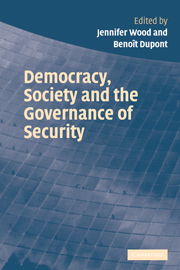Book contents
- Frontmatter
- Contents
- List of contributors
- Foreword
- Acknowledgements
- Introduction: Understanding the governance of security
- 1 Reflections on the refusal to acknowledge private governments
- 2 Transnational security governance
- 3 Two case studies of American anti-terrorism
- 4 Power struggles in the field of security: implications for democratic transformation
- 5 Policing and security as ‘club goods’: the new enclosures?
- 6 The state, the people and democratic policing: the case of South Africa
- 7 Necessary virtues: the legitimate place of the state in the production of security
- 8 From security to health
- 9 Research and innovation in the field of security: a nodal governance view
- Conclusion: The future of democracy
- References
- Index
6 - The state, the people and democratic policing: the case of South Africa
Published online by Cambridge University Press: 22 September 2009
- Frontmatter
- Contents
- List of contributors
- Foreword
- Acknowledgements
- Introduction: Understanding the governance of security
- 1 Reflections on the refusal to acknowledge private governments
- 2 Transnational security governance
- 3 Two case studies of American anti-terrorism
- 4 Power struggles in the field of security: implications for democratic transformation
- 5 Policing and security as ‘club goods’: the new enclosures?
- 6 The state, the people and democratic policing: the case of South Africa
- 7 Necessary virtues: the legitimate place of the state in the production of security
- 8 From security to health
- 9 Research and innovation in the field of security: a nodal governance view
- Conclusion: The future of democracy
- References
- Index
Summary
This chapter is concerned with the state of public policing in the ‘new’ South Africa and how policing can be democratized in years to come. We argue, in agreement with Loader and Walker (this volume), that while policing in South Africa, as elsewhere, is carried out by a multiplicity of social agencies, the state should assert itself as the ‘anchor of collective security provision’. The need for such state anchorage in South Africa is particularly important given the country's status as an emerging democracy, a term we feel is appropriate given South Africa's dramatic shift to democratic governance just ten years ago. This is because, more than is the case in established democracies, effective and collectively accepted ordering devices need to be instituted which enable all citizens to participate publicly in a secure social environment and which facilitate the forging of a collective identity based on shared ‘sense of trust and confidence and of rootedness in the social world’ (Loader and Walker 2004a: 25). At present in South Africa such rights and freedoms are limited. A national identity is only just beginning to be constructed but is constantly under threat given socially constructed images of dangerous and endangered groupings. Fears of insecurity and of becoming a crime victim pervade the society at all levels whereas, as we know, the capacity to mitigate or minimize these risks is unequally distributed (Brogden and Shearing 1993).
- Type
- Chapter
- Information
- Democracy, Society and the Governance of Security , pp. 139 - 164Publisher: Cambridge University PressPrint publication year: 2006
- 15
- Cited by



